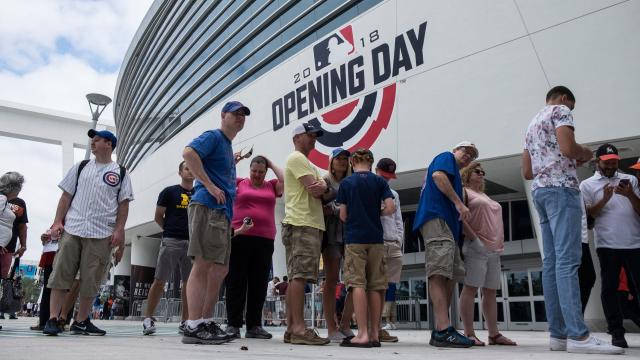Major League Baseball (MLB) and Clear announced a partnership on Thursday that will soon let baseball fans enter stadiums using fingerprints, and eventually, just their face, instead of tickets.
Clear, which offers similar biometric fast-tracking for participating airports, says it will let baseball fans link their Clear and MLB.com accounts. By sharing fingerprint data, visitors can bypass long lines at stadiums. 13 stadiums use Clear already.
“Our collaboration with CLEAR is an important new technology initiative, delivering safe, simple and seamless experiences for fans,” Noah Garden, MLB’s executive vice president of business, told Engadget. “Developing a partnership that will unify emerging identity technology and ticketing is reflective of our commitments to always improving ballpark accessibility and maintaining critical security standards.”
MLB stadium “Clear Lanes” will first use fingerprints, but Clear says it’s working on eventually bringing face recognition to MLB stadiums as well. Later, Clear says it aims to implement biometric payments as well, so sports fans could eventually pay for concessions with just their face or a finger. Clear is already used in airports across the country, usually so members can bypass security checks, but the company has experimented with other uses as well. Delta trialed biometric entry to its VIP lounges as well as a “biometric bag drop,” which used face recognition to identify travellers’ luggage.
Activists and privacy scholars are wary of facial recognition and fingerprinting being normalized, particularly because presenting them as convenient alternatives can obfuscate the risks. Bypassing long lines is appealing, but biometric data is extremely sensitive and impossible to replace. Because of its novelty, many people aren’t considering the risks of biometric data being used in these setting, though researchers certainly have. Woodrow Hartzog, Professor of Law and Computer Science at Northeastern University, explained to Gizmodo last year the real dangers of biometric convenience in a world where databreaches are common.
If a database of faceprints were compromised, it would have a ripple effect on authentication systems that used the faceprint, as well as possibly allow unauthorised parties to make use of the faceprint for surveillance. We’ve already seen some instances of facial recognition softwarebeing weaponised as a stalking tool. People, governments, and industries might be tempted to comb through social media feeds and photo databases using hacked faceprints to locate people in a much more efficient and dangerous way.
[Yahoo]
